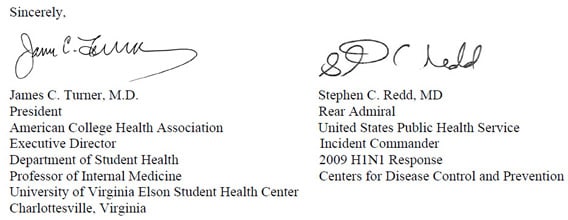# 4414
The American College Health Association (ACHA) has long had an interest in pandemic preparation, prevention - and over the past year - pandemic surveillance.
Their weekly update of ILI (Influenza-like-illness) activity on campuses around the country have been a ready barometer of the spread of novel H1N1 over the past year.
A couple of years ago I was fortunate enough to spend three days at their 2008 annual convention on behalf of the Readymoms Alliance talking to hundreds of visitors about pandemic issues.
It was almost a year ago when tens of thousands of college spring-breakers descended upon the beaches of Mexico, this coming at a time when the novel H1N1 virus was starting to circulate widely in that region.
While the virus would undoubtedly have spread to other countries without hitching a ride home with spring breakers, these college vacationers proved an extremely efficient form of conveyance.
This year, the ACHA in conjunction with the CDC, has issued a letter to students about to embark on Spring Break, urging that they avail themselves of the pandemic vaccine, and that they take common sense steps to avoid infection.
American College Health Association Spring Break Vaccination Letter
March 5, 2010
Don’t let influenza spoil your plans for Spring Break.
Although flu activity has declined in recent weeks, 2009 H1N1 Influenza viruses continue to spread in the United States and abroad, causing illness, hospitalizations and even deaths. Recently, several colleges and universities have reported increased influenza activity on their campuses. Flu activity is difficult to predict, but experts at the Centers for Disease Control and Prevention (CDC) expect that flu activity — caused by 2009 H1N1 or seasonal flu viruses — will continue for weeks, and parts of the world may even see big outbreaks. This season the 2009 H1N1 virus has hit young adults especially hard in terms of illness, as most young people do not have immunity to the virus. For these reasons, the CDC and the American College Health Association (ACHA) continue to encourage all students, faculty and staff at universities and colleges to protect themselves against 2009 H1N1 by getting vaccinated. In the spring of 2009, we saw the spread of 2009 H1N1 result in a lot of illness following travel associated with “Spring Break.” With the 2010 “Spring Break” coming up and large numbers of students expected to travel both domestically and internationally, getting vaccinated against 2009 H1N1 influenza is especially important.
The 2009 H1N1 influenza vaccine is readily available both on and off campus at school health clinics, doctor’s offices, state and local health departments and many pharmacies. Vaccination is the best way to protect yourself against 2009 H1N1 flu. And this protection is especially important if you have a health condition, such as asthma, diabetes, heart disease, pregnancy and other conditions that increase your risk of serious flu-related complications or hospitalization.
In addition to getting vaccinated, you can also take the following steps to help protect you from getting or spreading the flu and other illnesses while you’re on break:
- Talk to your health care provider not only about 2009 H1N1, but also other recommended, routine vaccinations you may need if traveling, especially overseas.
- Visit the CDC’s Travelers’ Health website (www.cdc.gov/travel) for more information and healthy travel recommendations to prevent influenza and other illnesses during travel. You can also find special information about spring break travel.
- Stay away from people who appear sick or are coughing or sneezing. The main way the flue spreads is through the droplets of coughs and sneezes.
- Practice good hygiene by washing your hands often with soap and water, especially after coughing and sneezing. If soap and water is not available, alcohol-based hand rubs are useful.
- Cover your coughs and sneezes with a tissue.
- Wash your hands often.
- Don’t share drinking glasses or utensils – avoid drinking beverages mixed in a common container or eating after others.
- Stay home (or away from others) if you are sick for 24 hours after your fever is gone to prevent others from getting sick too.
Spring Break is a time for rest, relaxation and fun with friends and family. Take the opportunity to get vaccinated before leaving for Spring Break and protect yourself, friends and family against 2009 H1N1 flu. Don’t let influenza spoil your plans — get vaccinated against 2009 H1N1.
Related Post:
Widget by [ Iptek-4u ]
